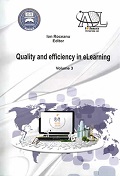DEVELOPING PROFESSIONAL ENGLISH VOCABULARY THROUGH COMPUTER BASED SIMULTED SITUATIONS
DEVELOPING PROFESSIONAL ENGLISH VOCABULARY THROUGH COMPUTER BASED SIMULTED SITUATIONS
Author(s): Maria AlexeSubject(s): Education
Published by: Carol I National Defence University Publishing House
Keywords: distance learning; virtual reality; professional vocabulary
Summary/Abstract: Studding foreign languages at academic level, in technical universities means not just improving your students’ vocabulary. The main target should be to develop all their language skills, but from the perspective of their future professional life. This is quite a difficult task because foreign languages, in Technical University of Civil Engineering, are part of the first two years curricula, a period when students are not familiar with their future profession and as a consequence they are not mastering professional vocabulary in their native language. . As many pedagogical approaches are underlining an adequate context through which new words are introduced is always of great help. That statement leads to the question of creating that context and here I may say virtual reality that can be imagined on the digital support is of great help The research main question refers to the advantages of using virtual reality, simulation if necessary, to improve students’ language abilities, to help them to learn faster and easier. Secondary research questions refer to the efficiency of this pedagogical approach and to the time management (can it be improved? Is it a time consuming method?). As this type of research refers to different case studies, the methodological approach, generally used for such research was implemented. This paper presents the results of suggested experiment which has been developed for two academic years (2009-2011) at the Faculty of Technological Equipment and Building Equipment (TUCE) and was extended to other foreign languages such as German and Spanish. Although they are not distance learning students, best practices of that type of learning methodology are often used. Its efficiency was measured through different types of tests.
Journal: Conference proceedings of »eLearning and Software for Education« (eLSE)
- Issue Year: 9/2013
- Issue No: 03
- Page Range: 249-254
- Page Count: 6
- Language: English

